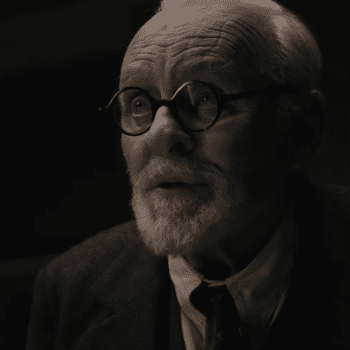Grief challenges us in a way nothing else can. When we love and lose someone, it’s as if someone flicked off the lights. We can’t move. We can barely breathe.
You’d think that faith would be a hard sell in times of grief. And yet, in those times of agony, faith often rescues us. We lean on that God, even if He feels distant. Our loved ones haven’t left us; they’ve gone home.
But faith wraps itself in such strange, silly garb sometimes; a gift beyond measure wrapped in supermarket fliers and masking tape. Sometimes when we try to give someone the hope of faith, we turn it trite; we make it a kitchen magnet or bumper sticker rather than giving the real deal, in all its messy complexity. And we lose our chance to help.
Manchester by the Sea is a powerful, moving story of grief and loss, of what happens when the lights flick off. And it gives us a scene that I can’t quite shake: It’s uncomfortably comic and, in some ways, completely unnecessary to the actual story. And yet in a few minutes, it says volumes about faith and how it can help … and how sometimes it doesn’t help at all.
Named Best Picture by the National Board of Review and newly minted Golden Globe nominee, Manchester by the Sea is the story of two guys: Lee Chandler (Casey Affleck), who returns to his hometown of Manchester, Mass. after his brother Joe dies and unexpectedly puts Lee in charge of Joe’s teenage son, Patrick (Lucas Hedges).
Both Lee and Patrick are obviously grieving: Patrick seems OK on the surface, but his tears come at odd moments. He unexpectedly freaks out over frozen chicken, reminding him that his father won’t be able to be buried until the ground thaws in the spring. Lee mourns Joe, too. When another tragedy tore Lee’s world apart, Joe was about the only stabilizing element in Lee’s life. Now Joe’s gone, and Lee’s been called back to the site of this soul-shattering disaster. His brother has posthumously asked him to become Patrick’s… what? Guardian? Father? Whatever it is, it’s a job Lee never wanted, never even imagined would fall to him.
Lee and Patrick are now bound together, forced to deal with a family tragedy and support each other the best they can. But for a time—a couple of moments in the film, really—it looks like they might find some help from an unexpected source.
Patrick’s mom, Elise (Gretchen Mol), was a mess when Patrick was younger. She drank way too much. She struggled with her mental health. When she and Joe split up, Joe was awarded custody and Elise was, for all practical purposes, banished. Joe thought that Elise was out of Patrick’s life forever.
But in the wake of Joe’s death, Elise—now a much different woman than she was—wants to help if she can. She invites Patrick to lunch. Patrick warily agrees.
Patrick arrives and finds Elise chipper and seemingly together. She introduces Patrick to her new “fella,” Jeffrey (Matthew Broderick). Their home is festooned with Christian knickknacks—a hokey painting of Jesus on the walls, verses on the shelves. They sit down and say grace, and as soon as the prayer is over, Elise turns to Patrick and tells him it’s OK for him not to say “amen.” “We’re not trying to convert you,” she says.
But he did say amen. “Just quietly,” he tells her. Things go downhill from there. Soon, Elise makes an excuse to leave the room and gather her senses. Jeffrey scurries after her.
After dinner, Lee asks Patrick how everything went. How was Elise doing? What was Jeffrey like?
“He was very … Christian,” Patrick says.
Lee reminds Patrick that their family is Catholic, and thus Christian, too. Truth is, the majority of America is Christian. But when Patrick describes Jeffrey, it’s painfully apt. We all know Christians who fill the role a little too well. Uncomfortably Christian. And if we don’t know a Christian like that … well, perhaps we should glance at the mirror a moment.
The scene is so uncomfortable, and feels so true, that it’s easy to lose sight of something important here: Christianity—at least for Elise on some level, seems to have truly saved her. She’s not drunk. She’s not passing out on the couch exposing her privates anymore, as we see in a sad flashback. We don’t need to hear Elise’s practiced Christian testimony to know she’s got a doozy to share. And both she and Jeffrey do their painful best to put Patrick at ease.
But the more your host says, “Well, I sure hope you’re comfortable here,” the more uncomfortable you become. You can’t force ease. You can’t pressure someone into emotional intimacy. Watching Elise and Jeffrey work over Patrick feels a little like Frank Costanza from that old Seinfeld episode shouting at the top of his lungs, “Serenity Now!”
Lee doesn’t have any answers for Patrick. Sometimes, he barely can deal with the teen at all. And honestly, most Christians would really struggle with some of the decisions Lee makes to “help.” Frankly, Jeffrey might appreciate my Plugged In review.
But Lee gives something to Patrick that Jeffrey or Elise can’t offer: His grief. His pain. His raw, bewildered honesty.
Even if faith means something to Elise—even if it means everything—she and Jeffrey have done such a number on polishing its outward appearance that it looks fake. It looks shallow. He’s so … Christian, Patrick says. He says it without malice, but he makes his message clear: They may be good people, but they don’t know. They don’t know how to deal with the pain I suffer, the life I lead. They have nothing to offer me.
And maybe he’s right. Maybe Elise with her problems and Jeffrey with his preoccupations wouldn’t, couldn’t know.
But maybe they could. And maybe if they allowed a little mess to seep into their delicate little dining room, allowed some of their own weakness to show through, Patrick would’ve given them a chance.













